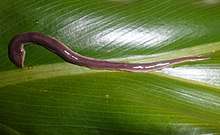Matuxia
Matuxia is a genus of land planarians from Brazil.
| Matuxia | |
|---|---|
 | |
| Matuxia tymbyra | |
| Scientific classification | |
| Kingdom: | |
| Phylum: | |
| Class: | |
| Order: | |
| Suborder: | |
| Family: | |
| Subfamily: | |
| Genus: | Matuxia Carbayo et al., 2013 |
| Type species | |
| Geoplana tuxaua E. M. Froehlich, 1955 | |
Description
The genus Matuxia is characterized by having a slender body with nearly parallel margins, reaching up to 12 cm in length, and being slightly convex on both dorsal and ventral sides. The eyes are arranged along the body margins, not occupying the dorsum. The copulatory apparatus has an apparent penis papilla, a structure similar to a true penis papilla, but having an ejaculatory cavity instead of an ejaculatory duct. The female cavity is rounded and filled with a multilayered epithelium.[1]
Etymology
Matuxia is a portmanteau of the specific epithets of the two first species of the genus to be described, matuta and tuxaua, and the first name of Eudóxia Maria Froehlich, who described both M. matuta and M. tuxaua.[1]
Species
There are three species assigned to the genus Matuxia:
- Matuxia matuta (E. M. Froehlich, 1955)
- Matuxia tuxaua (E. M. Froehlich, 1955)
- Matuxia tymbyra Rossi & Leal-Zanchet, 2019[2]
References
- Carbayo, F.; Álvarez-Presas, M.; Olivares, C. U. T.; Marques, F. P. L.; Froehlich, E. X. M.; Riutort, M. (2013). "Molecular phylogeny of Geoplaninae (Platyhelminthes) challenges current classification: Proposal of taxonomic actions". Zoologica Scripta. 42 (5): 508. doi:10.1111/zsc.12019.
- Rossi, Ilana; Amaral, Silvana Vargas; Ribeiro, Giovana Gamino; Müller, Mário Josias; Valiati, Victor Hugo; Leal-Zanchet, Ana Maria (2019). "Phylogenetic relationships within the flatworm genus Matuxia (Platyhelminthes, Tricladida, Continenticola) inferred from molecular data with the description of a southern lineage of the genus". Organisms Diversity & Evolution. doi:10.1007/s13127-019-00410-6. ISSN 1439-6092.